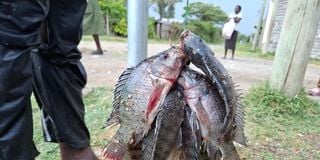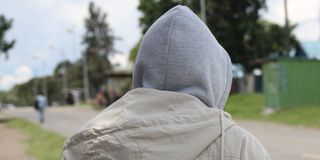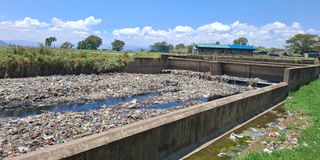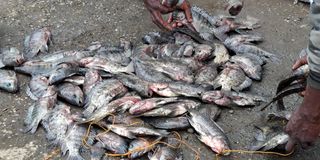Giza Ziwani: Fisherman reveals disturbing details of illegal fish business in Lake Nakuru

Some of the fish caught in Lake Nakuru. Photo taken on March 18, 2025.
As darkness encroaches and the world prepares to sleep, Martin Mwenje (not his real name) and his seven-man crew are at the fence of the Lake Nakuru National Park, picking up the fishing nets they’d hid amongst the trees the previous day and set to sail into the lake.
He reveals that before heading into the waters, the group always pools around Sh. 10,000 per night, which is handed over to a Kenya Wildlife Service (KWS) officer, whom they’ve made acquaintance with, to ensure safe passage into the protected Lake Nakuru National park.
Initially, Mwenje says they paid in cash or via M-Pesa, but the officers preferred cash.
“We later switched to mobile money for proof," Mwenje explains. "

Martin Mwenje (not his real name) narrates to Mtaa Wangu about the illegal fishing business in Lake Nakuru on March 27,2025.
If we meet a different officer or the same one denies that we paid them, we just show the transaction message and say, 'Tulimalizana na nani…' [We settled the matter with someone], and they leave us alone.”
Their night starts at 10 p.m.
Before entering the water, he explains that they lather petroleum jelly on their genitals and bodies, noting that it acts as a protective layer, helping to minimize irritation and discomfort caused by the water.
Mwenje says the first time he went into the lake without applying the oil, he developed an uncomfortable itch on his genitals which was unbearable. After that, he never went without it.
But when did all this begin?
In 2021, right after finishing secondary school, Mwenje says he was drawn to fishing out of necessity.
With limited job opportunities, he saw youth who came from Naivasha begin to explore the untapped potential of Lake Nakuru, a year after fish were sighted.
"They saw an opportunity and I followed suit," he says simply.
However, his primary motivation was supporting his elderly grandmother, who raised him after losing his parents.
"She's old and needs medication for diabetes, blood pressure, and arthritis. I provide for her," Mwenje says softly.
Fishing in Lake Nakuru
At the time of going into the lake, he explains that they always decide which four of the eight will sail in the makeshift boat to cast the nets, while the other four push the boat toward the direction of the ‘deep,’-the deepest part of the lake which has more fish.
“We hold out a bit as we watch the ones in the boat paddle off into the distance, and then we return to shore, waiting as the nets are cast in strategic places. Afterward, the four who had been on the boat paddle back to join the rest of us. We all keep watch under a tree, looking out for wild animals and the KWS officers, whom we dread. Sometimes, it’s so dark that we use the light from a lit cigarette to guide us into the lake,” Mwenje says.
When we ask how they came about accessing the protected area, he notes that for the longest time, access to the park was quite hard, but over time, the electric fence run down.
"When we started, the electric fence had four lines, it still does," he explains. "The lowest one, just above the ground, was set up with high-voltage electricity, while the others had no power. To get past, we’d risk stepping on the second-to-last wire and holding onto two other wires with our hands and passing through."
Over time, due to the constant traffic of illegal fishermen, the fence became dilapidated.
Mwenje notes that fast forward to the #FreeBrianOdhiambo protests this year, KWS reinforced the park's fence.
This time, all four sections were set up with high-voltage electricity because, during the protests, agitated youth set fire to a section of the park near the Manyani area.
"This has forced us to use the sewer line that directs rainwater into the lake bordering resident houses near the NAWASSCO sewage plant,” he says.

A section of the sewer line leading to Lake Nakuru National Park where fishermen walk on to access the park. Photo taken on March 18,2025.
He goes on to say that for two hours till midnight, they are on the lookout.
Between midnight and 1 a.m., they head back into the water to load their morning’s catch into sacks together with their nets and their next destination is the market.
“We always ensure that by 2 a.m. we are done packing and are headed out of the park. KWS officers always patrol at about 3 a.m. Over the fence, two riders are always on standby. They help lift the heavy loads out of the park, loading them onto their motorcycles before speeding off toward the market by 5 a.m.”
Selling of the fish
At 7 a.m. they’re done with business and count their night’s earnings after the scramble and partition by fishmongers for the ‘forbidden fruit’ from Lake Nakuru- which does not seem to bother either the fishermen who brought them in or the traders.

Fishermen sort fish from Lake Nakuru before selling it to traders on March 18, 2025.
In a night, Mwenje explains that they earn between Sh. 40,000 (on bad days) and Sh. 100,000 (on good days) from about five to seven sacks.
One sack he says could hold up to 70 fish of different sizes.
This is also always dependent on whether it rains as he says, the currents push fish towards their direction in addition to using bait (which they buy for Sh. 400 a kilo).
“When we’re done selling the fish, we all head home to rest and recharge. Later, around 5 p.m., we meet at our usual hangout place, by the lake, asking other fishermen how their day’s expedition has been. This is always our way to find out if the wardens have increased or decreased their patrol during the day and other nitty-gritty information before we convene at our meeting point at 8 p.m. as we prepare to go back into the lake,” Mwenje notes.
Mwenje admits that what he does is risky.
“If they (KWS officers) catch you, they don't care about the small bribe you’d earlier paid. They’ll take you to the police, and you won’t leave without parting with less than Sh. 40,000 as cash bail yet sometimes the lake doesn’t give anything back,” he says in frustration and calls betrayal on the officers’ part.
“Sometimes, I want to quit,” Mwenje confesses.
“They (KWS officers) once beat me with stinging nettle branches ‘thafai’ just after they caught me in water when I had my shorts on and took all my night’s catch. This took a toll on me. They’ve made it a habit to take people’s clothes, hide them, and tell you to come out of the water, then beat you and even take your fish.”
For a few nights now, he’s not been in the lake as he’s tending to his sickly grandmother.
In the meantime, he’s decided to visit the government premises for his ID since the government miraculously decided to waive the application fees for new applicants.
We enquire why he’s not had the document since he came of age to which he asks, “For what? It did not seem important then and with the lifted ban, it just seems more appropriate. I’ve also been thinking about going back to school to probably pursue plumbing, masonry, or electronic and electrical engineering at a TVET.”
As he looks toward the future, Mwenje says he hopes to find another job so that he stops going to the lake as the recent surge of bodies of other fishermen like him in the Park is worrying him.
He says that he’s now started doing menial jobs like building desks in nearby furniture places.
Tomorrow: We highlight the story of two men who went into the Park, never to be seen again.
